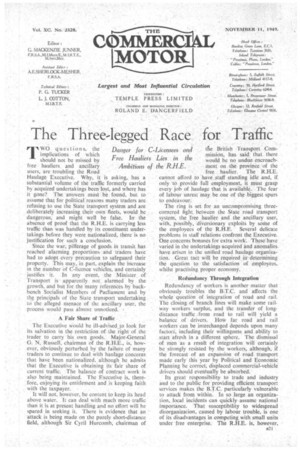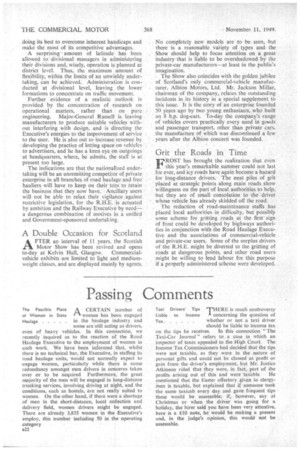The Three-legged Race for Tra ffic 1 ' . WO questions, the' implications
Page 55

Page 56

If you've noticed an error in this article please click here to report it so we can fix it.
of which should not be missed by free hauliers and ancillary users, are troubling the Road Haulage Executive. Why, it is asking, has a Substantial volume of the traffic formerly carried by acquired undertakings been lost, and where has it gone? The answers, must be found, but to assume that for political reasons may traders are reftising to use the State transport system and are deliberately increasing their own fleets, wouldbc dangerous-, and might well be false. Ity the absence of proof that the R.H.E. is can-ying less traffic than was handled by its constituent undertakings before they were nationalized, there is no justification for such a conclusion: Since the War, pilferage of goods in transit has reached alarming proportions.and traders have had to adopt every precaution to safeguard their property. This may, in part, explain the increase in the number of C-licence vehicles, and certainly justifies it. In any event, the Minister, of Transport is apparently not alarmed by the growth, and hut for the many referenees by backbench Socialist Members of Parliament and by the principals of the State transport undertaking to the alleged menace of the ancillary user, the process would pass almost unnoticed. .
A Fair Share of Traffic The Executive Would be ill-advised, to look for its salvation in the restriction.of :the right of the trader to carry his own goods. Major-General G. N. Russell, chairman of the R.H.E., is, however, obviously perturbed by the failure of many traders to continue to deal with haulage concerns that have been nationalized, although he admits that the Executive is obtaining its' fair share of current traffic. The balance of contract work is also being maintained. The Executive is, therefore, enjoying its entitlement and is keeping faith
with the taxpayer. .
It will not, however, be con tent to keep its head above water. It can deal with much more traffic than it is at present handling and no effOrt will be spared in seeking it. There is evidence that an attack is being made on the purely short-distance field, although Sir Cyril Hurcomb, chairman of
tfie British Transport Commission, has said that there would be no undue encroachMent on the province 'of the free haulier. The R.H.E. cannot afford to have staff standing idle and if only-io provide full employment, it must grasp every job of haulage that is available. The fear of labour unrest may be one of the biggest spurs
to endeavour.
The ring is set for an uncompromising threecornered fight between the State road transport syStem, the free .haulier and the ancillary user, with, possibly, diversionary exploits by some of the employees of the R.H.E. Several delicate problems in staff relations confront the Executive. One concerns bonuses for extra work: These have varied in the undertakings acquired And anomalies have arisen in the unified road haulage organiza
tion. Great tact will be required determining the quesiion to the satisfaction of •employees, whilst practising proper economy.
Redundancy Through Integration Redundancy of workers is another matter that obviously troubles the B.T.C. and affects the whole questiem of integration of road and rail. The closing of branch lines will make some railway workers surplus, and the transfer of longdistance traffic ,from road to rail will yield a balance of drivers. How far road and rail workers can be interchanged depends upon many factor, including their willingness and ability to start afresh in a different sphere. The dismissal of ITIrerl as a result of integration will certainly be strongly resisted by the workers, although, if the forecast of an expansion of road transport madeearly this year by Political and Economic Planning be correct, displaced commercial-vehicle drivers should eventually be absorbed: Its great responsibility to trade and industry and to the public for providing efficient transport services makes the B.T.C. particularly vulnerable to attack from within. In so large an organization, local incidents can quickly assume national importance. That susceptibility to widespread disorganization, caused by labour trouble, is one of its disadvantages in competing with-small units under free enterprise. The R.H.E. is, however, doing its best to overcome inherent handicaps and make the most of its competitive advantages.
• A surprising amount of latitude has been allowed to divisional managers in administering their divisions and, wisely, operation is planned at district level. Thus, the maximum amount of flexibility, within the limits of an unwieldy undertaking, can be achieved. Administration is conducted at divisional level, leaving the lower formations to concentrate on traffic movement.
Further evidence of a realistic :outlook is provided by the concentration of research on operational matters, rather than on pure engineering. Major-General Russell is leaving manufacturers to produce suitable vehicles without interfering with design, and is directing the Executive's energies to the improvement of service to the user. He is also out to increase revenue by developing the practice of letting space on vehicles -, to advertisers, and he has a keen eye on outgoings at headquarters, where, he admits, the staff is at present too large.
The indications are that the nationalized under taking will be an unremitting competitor of private • enterprise in all branches of road haulage and free hauliers will have to keep on their tries to retain the business that they now have.. Ancillary users will not be able to relax their vigilance against restrictive legislation, for the R.H.E. :is actuated by ambition and the Railway Executive by need— a dangerous combination of motives in a unified and Government-sponsored undertaking,
A Double Occasion for Scotland
AFTER an interval of 11 years, the Scottish Motor Show has been revived and opens to-day at Kelvin Hall, Glasgow. Commercialvehicle exhibits are limited to light and mediumweight classes, and are displayed mainly by agents. No completely new models are to be seen, but there is a reasonable variety of types and the Show should help to focus attention on a great industry that is liable to be overshadowed by the private-car manufacturers—at least in the public's imagination.
• The Show also coincides with the golden jubilee of Scotland's only commercial-vehicle manufacturer. Albion .Motors, Ltd. Mr. Jackson Millar, chairman of the company, relates the outstanding incidents in,its history in a special supplement tO this. issue. It is the story of an enterprise founded 50 years ago by two young enthusiasts, who built an 8 h.p. dog-cart. To-day the company's range of vehicles covers practically every, need in goods and passenger transport. other than private cars. the manufacture of which was discontinued a few years after the Albion concerti was founded.
Grit the Roads in Time
ROST has brought the realization that even this year's remarkable summer could not last for ever, and icy roads have again become a hazard for long-distance drivers. The neat piles of grit placed at strategic points along main roads show willingness on the part of local authorities to help, but they are of small consolation to the driver whose vehicle has already skidded off the road.
The reduction of road-maintenance staffs has placed local authorities in difficulty, but possibly some scheme for gritting roads at the first sign of frost could be developed by highways authorities in conjunction with the Road Haulage Executive and the associations of commercial-vehicle and private-car users. Some of the surplus drivers of the R.H.E. might be diverted to the gritting of roads at dangerous points, and other road users might be willing to lend labour for this purpose if a properly administered scheme were developed.
































































































































































































